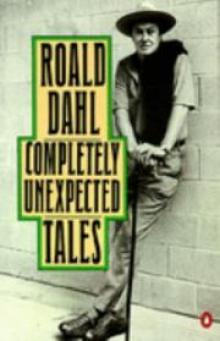- Home
- Roald Dahl
The Best of Roald Dahl Page 9
The Best of Roald Dahl Read online
Page 9
The auctioneer was standing up behind his table now. 'Ladies and gentlemen!' he shouted. 'The captain has estimated the day's run, ending midday tomorrow, at five hundred and fifteen miles. As usual we will take the ten numbers on either side of it to make up the range. That makes it five hundred and five to five hundred and twenty-five. And of course for those who think the true figure will be still farther away, there'll be "low field" and "high field" sold separately as well. Now, we'll draw the first number out of the hat ... here we are ... five hundred and twelve?'
The room became quiet. The people sat still in their chairs, all eyes watching the auctioneer. There was a certain tension in the air, and as the bids got higher, the tension grew. This wasn't a game or a joke; you could be sure of that by the way one man would look across at another who had raised his bid - smiling perhaps, but only the lips smiling, the eyes bright and absolutely cold.
Number five hundred and twelve was knocked down for one hundred and ten pounds. The next three or four numbers fetched roughly the same amount.
The ship was rolling heavily, and each time she went over, the wooden panelling on the walls creaked as if it were going to split. The passengers held on to the arms of their chairs, concentrating upon the auction.
'Low field!' the auctioneer called out. 'The next number is low field.'
Mr Botibol sat up very straight and tense. He would wait, he had decided, until the others had finished bidding, then he would jump in and make the last bid. He had figured that there must be at least five hundred dollars in his account at the bank at home, probably nearer six. That was about two hundred pounds - over two hundred. This ticket wouldn't fetch more than that.
'As you all know,' the auctioneer was saying, 'low field covers every number below the smallest number in the range, in this case every number below five hundred and five. So, if you think this ship is going to cover less than five hundred and five miles in the twenty-four hours ending at noon tomorrow, you better get in and buy this number. So what am I bid?'
It went clear up to one hundred and thirty pounds. Others besides Mr Botibol seemed to have noticed that the weather was rough. One hundred and forty ... fifty ... There it stopped. The auctioneer raised his hammer.
'Going at one hundred and fifty ...'
'Sixty!' Mr Botibol called, and every face in the room turned and looked at him.
'Seventy!'
'Eighty!' Mr Botibol called.
'Ninety!'
'Two hundred!' Mr Botibol called. He wasn't stopping now - for anyone.
There was a pause.
'Any advance on two hundred pounds?'
Sit still, he told himself. Sit absolutely still and don't look up. Hold your breath. No one's going to bid you up so long as you hold your breath.
'Going for two hundred pounds ...' The auctioneer had a pink bald head and there were little beads of sweat sparkling on top of it. 'Going ...' Mr Botibol held his breath. 'Going ... Gone!' The man banged the hammer on the table. Mr Botibol wrote out a cheque and handed it to the auctioneer's assistant, then he settled back in his chair to wait for the finish. He did not want to go to bed before he knew how much there was in the pool.
They added it up after the last number had been sold and it came to twenty-one hundred-odd pounds. That was around six thousand dollars. Ninety per cent to go to the winner, ten per cent to seamen's charities. Ninety per cent of six thousand was five thousand four hundred. Well - that was enough. He could buy the Lincoln convertible and there would be something left over, too. With this gratifying thought he went off, happy and excited, to his cabin.
When Mr Botibol awoke the next morning he lay quite still for several minutes with his eyes shut, listening for the sound of the gale, waiting for the roll of the ship. There was no sound of any gale and the ship was not rolling. He jumped up and peered out of the porthole. The sea - Oh Jesus God - was smooth as glass, the great ship was moving through it fast, obviously making up for time lost during the night. Mr Botibol turned away and sat slowly down on the edge of his bunk. A fine electricity of fear was beginning to prickle under the skin of his stomach. He hadn't a hope now. One of the higher numbers was certain to win it after this.
'Oh my God,' he said aloud. 'What shall I do?'
What, for example, would Ethel say? It was simply not possible to tell her that he had spent almost all of their two years' savings on a ticket in the ship's pool. Nor was it possible to keep the matter secret. To do that he would have to tell her to stop drawing cheques. And what about the monthly instalments on the television set and the Encyclopaedia Britannica? Already he could see the anger and contempt in the woman's eyes, the blue becoming grey and the eyes themselves narrowing as they always did when there was anger in them.
'Oh my God. What shall I do?'
There was no point in pretending that he had the slightest chance now - not unless the goddam ship started to go backwards. They'd have to put her in reverse and go full speed astern and keep right on going if he was to have any chance of winning it now. Well, maybe he should ask the captain to do just that. Offer him ten per cent of the profits. Offer him more if he wanted it. Mr Botibol started to giggle. Then very suddenly he stopped, his eyes and mouth both opening wide in a kind of shocked surprise. For it was at this moment that the idea came. It hit him hard and quick, and he jumped up from his bed, terribly excited, ran over to the porthole and looked out again. Well, he thought, why not? Why ever not? The sea was calm and he wouldn't have any trouble keeping afloat until they picked him up. He had a vague feeling that someone had done this thing before, but that didn't prevent him from doing it again. The ship would have to stop and lower a boat, and the boat would have to go back maybe half a mile to get him, and then it would have to return to the ship and be hoisted back on board. It would take at least an hour, the whole thing. An hour was about thirty miles. It would knock thirty miles off the day's run. That would do it. 'Low field' would be sure to win it then. Just so long as he made certain someone saw him falling over; but that would be simple to arrange. And he'd better wear light clothes, something easy to swim in. Sports clothes, that was it. He would dress as though he were going up to play some deck tennis - just a shirt and a pair of shorts and tennis shoes. And leave his watch behind. What was the time? Nine-fifteen. The sooner the better, then. Do it now and get it over with. Have to do it soon, because the time limit was midday.
Mr Botibol was both frightened and excited when he stepped out on to the sun deck in his sports clothes. His small body was wide at the hips, tapering upward to extremely narrow sloping shoulders, so that it resembled, in shape at any rate, a bollard. His white skinny legs were covered with black hairs, and he came cautiously out on deck, treading softly in his tennis shoes. Nervously he looked around him. There was only one other person in sight, an elderly woman with very thick ankles and immense buttocks who was leaning over the rail staring at the sea. She was wearing a coat of Persian lamb and the collar was turned up so Mr Botibol couldn't see her face.
He stood still, examining her carefully from a distance. Yes, he told himself, she would probably do. She would probably give the alarm just as quickly as anyone else. But wait one minute, take your time, William Botibol, take your time. Remember what you told yourself a few minutes ago in the cabin when you were changing? You remember that?
The thought of leaping off a ship into the ocean a thousand miles from the nearest land had made Mr Botibol - a cautious man at the best of times - unusually advertent. He was by no means satisfied yet that this woman he saw before him was absolutely certain to give the alarm when he made his jump. In his opinion there were two possible reasons why she might fail him. Firstly, she might be deaf and blind. It was not very probable, but on the other hand it might be so, and why take a chance? All he had to do was check it by talking to her for a moment beforehand. Secondly - and this will demonstrate how suspicious the mind of a man can become when it is working through self-preservation and fear - secondly, it had occurre
d to him that the woman might herself be the owner of one of the high numbers in the pool and as such would have a sound financial reason for not wishing to stop the ship. Mr Botibol recalled that people had killed their fellows for far less than six thousand dollars. It was happening every day in the newspapers. So why take a chance on that either? Check on it first. Be sure of your facts. Find out about it by a little polite conversation. Then, provided that the woman appeared also to be a pleasant, kindly human being, the thing was a cinch and he could leap overboard with a light heart.
Mr Botibol advanced casually towards the woman and took up a position beside her, leaning on the rail. 'Hullo,' he said pleasantly.
She turned and smiled at him, a surprisingly lovely, almost a beautiful smile, although the face itself was very plain. 'Hullo,' she answered him.
Check, Mr Botibol told himself, on the first question. She is neither blind nor deaf. 'Tell me,' he said, coming straight to the point, 'what did you think of the auction last night?'
'Auction?' she asked, frowning. 'Auction? What auction?'
'You know, that silly old thing they have in the lounge after dinner, selling numbers on the ship's daily run. I just wondered what you thought about it.'
She shook her head, and again she smiled, a sweet and pleasant smile that had in it perhaps the trace of an apology. 'I'm very lazy,' she said. 'I always go to bed early. I have my dinner in bed. It's so restful to have dinner in bed.'
Mr Botibol smiled back at her and began to edge away. 'Got to go and get my exercise now,' he said. 'Never miss my exercise in the morning. It was nice seeing you. Very nice seeing you ...' He retreated about ten paces, and the woman let him go without looking around.
Everything was now in order. The sea was calm, he was lightly dressed for swimming, there were almost certainly no man-eating sharks in this part of the Atlantic, and there was this pleasant kindly old woman to give the alarm. It was a question now only of whether the ship would be delayed long enough to swing the balance in his favour. Almost certainly it would. In any event, he could do a little to help in that direction himself. He could make a few difficulties about getting hauled up into the lifeboat. Swim around a bit, back away from them surreptitiously as they tried to come up close to fish him out. Every minute, every second gained would help him win. He began to move forward again to the rail, but now a new fear assailed him. Would he get caught in the propeller? He had heard about that happening to persons falling off the sides of big ships. But then, he wasn't going to fall, he was going to jump, and that was a very different thing. Provided he jumped out far enough he would be sure to clear the propeller.
Mr Botibol advanced slowly to a position at the rail about twenty yards away from the woman. She wasn't looking at him now. So much the better. He didn't want her watching him as he jumped off. So long as no one was watching he would be able to say afterwards that he had slipped and fallen by accident. He peered over the side of the ship. It was a long, long drop. Come to think of it now, he might easily hurt himself badly if he hit the water flat. Wasn't there someone who once split his stomach open that way, doing a belly flop from a high dive? He must jump straight and land feet first. Go in like a knife. Yes sir. The water seemed cold and deep and grey and it made him shiver to look at it. But it was now or never. Be a man, William Botibol, be a man. All right then ... now ... here goes ...
He climbed up on to the wide wooden toprail, stood there poised, balancing for three terrifying seconds, then he leaped - he leaped up and out as far as he could go and at the same time he shouted 'Help!'
'Help! Help!' he shouted as he fell. Then he hit the water and went under.
When the first shout for help sounded, the woman who was leaning on the rail started up and gave a little jump of surprise. She looked around quickly and saw sailing past her through the air this small man dressed in white shorts and tennis shoes, spread-eagled and shouting as he went. For a moment she looked as though she weren't quite sure what she ought to do: throw a life belt, run away and give the alarm, or simply turn and yell. She drew back a pace from the rail and swung half round facing up to the bridge, and for this brief moment she remained motionless, tense, undecided. Then almost at once she seemed to relax, and she leaned forward far over the rail, staring at the water where it was turbulent in the ship's wake. Soon a tiny round black head appeared in the foam, an arm was raised about it, once, twice, vigorously waving, and a small faraway voice was heard calling something that was difficult to understand. The woman leaned still farther over the rail, trying to keep the little bobbing black speck in sight, but soon, so very soon, it was such a long way away that she couldn't even be sure it was there at all.
After a while another woman came out on deck. This one was bony and angular, and she wore horn-rimmed spectacles. She spotted the first woman and walked over to her, treading the deck in the deliberate, military fashion of all spinsters.
'So there you are,' she said.
The woman with the fat ankles turned and looked at her, but said nothing.
'I've been searching for you,' the bony one continued. 'Searching all over.'
'It's very odd,' the woman with the fat ankles said. 'A man dived overboard just now, with his clothes on.'
'Nonsense!'
'Oh yes. He said he wanted to get some exercise and he dived in and didn't even bother to take his clothes off.'
'You better come down now,' the bony woman said. Her mouth had suddenly become firm, her whole face sharp and alert, and she spoke less kindly than before. 'And don't you ever go wandering about on deck alone like this again. You know quite well you're meant to wait for me.'
'Yes, Maggie,' the woman with the fat ankles answered, and again she smiled, a tender, trusting smile, and she took the hand of the other one and allowed herself to be led away across the deck.
'Such a nice man,' she said. 'He waved to me.'
Skin
[1952]
That year - 1946 - winter was a long time going. Although it was April, a freezing wind blew through the streets of the city, and overhead the snow clouds moved across the sky.
The old man who was called Drioli shuffled painfully along the sidewalk of the Rue de Rivoli. He was cold and miserable, huddled up like a hedgehog in a filthy black coat, only his eyes and the top of his head visible above the turned-up collar.
The door of a cafe opened and the faint whiff of roasting chicken brought a pain of yearning to the top of his stomach. He moved on, glancing without any interest at the things in the shop windows - perfume, silk ties and shirts, diamonds, porcelain, antique furniture, finely bound books. Then a picture gallery. He had always liked picture galleries. This one had a single canvas on display in the window. He stopped to look at it. He turned to go on. He checked, looked back; and now, suddenly, there came to him a slight uneasiness, a movement of the memory, a distant recollection of something, somewhere, he had seen before. He looked again. It was a landscape, a clump of trees leaning madly over to one side as if blown by a tremendous wind, the sky swirling and twisting all around. Attached to the frame there was a little plaque, and on this it said: CHAIM SOUTINE (1894-1943).
Drioli stared at the picture, wondering vaguely what there was about it that seemed familiar. Crazy painting, he thought. Very strange and crazy - but I like it ... Chaim Soutine ... Soutine ... 'By God!' he cried suddenly. 'My little Kalmuck, that's who it is! My little Kalmuck with a picture in the finest shop in Paris! Just imagine that!'
The old man pressed his face closer to the window. He could remember the boy - yes, quite clearly he could remember him. But when? When? The rest of it was not so easy to recollect. It was so long ago. How long? Twenty - no, more like thirty years, wasn't it? Wait a minute. Yes - it was the year before the war, the first war, 1913. That was it. And this Soutine, this ugly little Kalmuck, a sullen brooding boy whom he had liked - almost loved - for no reason at all that he could think of except that he could paint.
And how he could paint! It was comi
ng back more clearly now - the street, the line of refuse cans along the length of it, the rotten smell, the brown cats walking delicately over the refuse, and then the women, moist fat women sitting on the doorsteps with their feet upon the cobblestones of the street. Which street? Where was it the boy had lived?
The Cite Falguiere, that was it! The old man nodded his head several times, pleased to have remembered the name. Then there was the studio with the single chair in it, and the filthy red couch that the boy had used for sleeping; the drunken parties, the cheap white wine, the furious quarrels, and always, always the bitter sullen face of the boy brooding over his work.
It was odd, Drioli thought, how easily it all came back to him now, how each single small remembered fact seemed instantly to remind him of another.
There was that nonsense with the tattoo, for instance. Now, that was a mad thing if ever there was one. How had it started? Ah, yes - he had got rich one day, that was it, and he had bought lots of wine. He could see himself now as he entered the studio with the parcel of bottles under his arm - the boy sitting before the easel, and his (Drioli's) own wife standing in the centre of the room, posing for her picture.
'Tonight we shall celebrate,' he said. 'We shall have a little celebration, us three.'
'What is it that we celebrate?' the boy asked without looking up. 'Is it that you have decided to divorce your wife so she can marry me?'
'No,' Drioli said. 'We celebrate because today I have made a great sum of money with my work.'
'And I have made nothing. We can celebrate that also.'

 My Uncle Oswald
My Uncle Oswald The Best of Roald Dahl
The Best of Roald Dahl The Magic Finger
The Magic Finger Charlie and the Chocolate Factory
Charlie and the Chocolate Factory Fantastic Mr Fox
Fantastic Mr Fox Matilda
Matilda Completely Unexpected Tales: Tales of the Unexpected. More Tales of the Unexpected
Completely Unexpected Tales: Tales of the Unexpected. More Tales of the Unexpected The Wonderful Story of Henry Sugar and Six More
The Wonderful Story of Henry Sugar and Six More The Twits
The Twits The BFG
The BFG Danny the Champion of the World
Danny the Champion of the World The Witches
The Witches James and the Giant Peach
James and the Giant Peach Charlie and the Great Glass Elevator
Charlie and the Great Glass Elevator Skin and Other Stories
Skin and Other Stories Kiss Kiss
Kiss Kiss Switch Bitch
Switch Bitch The Giraffe and the Pelly and Me
The Giraffe and the Pelly and Me Ah, Sweet Mystery of Life
Ah, Sweet Mystery of Life Fear
Fear The Great Automatic Grammatizator and Other Stories
The Great Automatic Grammatizator and Other Stories Someone Like You
Someone Like You Charlie and the Great Glass Elevator c-2
Charlie and the Great Glass Elevator c-2 More About Boy
More About Boy Tales of the Unexpected
Tales of the Unexpected The Umbrella Man and Other Stories
The Umbrella Man and Other Stories Dirty Beasts
Dirty Beasts Roald Dahl's Mischief and Mayhem
Roald Dahl's Mischief and Mayhem The Collected Short Stories of Roald Dahl, Volume 1
The Collected Short Stories of Roald Dahl, Volume 1 The Missing Golden Ticket and Other Splendiferous Secrets
The Missing Golden Ticket and Other Splendiferous Secrets Billy and the Minpins
Billy and the Minpins Over to You
Over to You Going Solo
Going Solo Deception
Deception War
War Man from the South ee-3
Man from the South ee-3 More Tales of the Unexpected
More Tales of the Unexpected Trickery
Trickery Rhyme Stew
Rhyme Stew Charlie and the Chocolate Factory (Puffin Modern Classics relaunch)
Charlie and the Chocolate Factory (Puffin Modern Classics relaunch) D is for Dahl
D is for Dahl Roald Dahl Whoppsy-Whiffling Joke Book
Roald Dahl Whoppsy-Whiffling Joke Book Spotty Powder and other Splendiferous Secrets
Spotty Powder and other Splendiferous Secrets Charlie and the Chocolate Factory c-1
Charlie and the Chocolate Factory c-1 Boy
Boy Completely Unexpected Tales
Completely Unexpected Tales Madness
Madness Innocence
Innocence Cruelty
Cruelty George's Marvellous Medicine
George's Marvellous Medicine